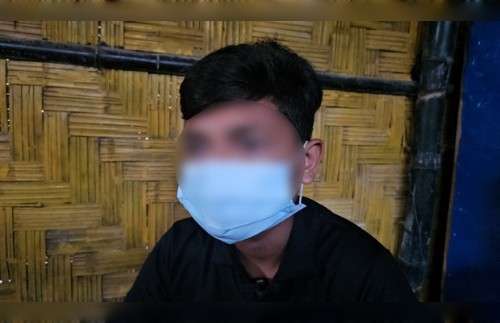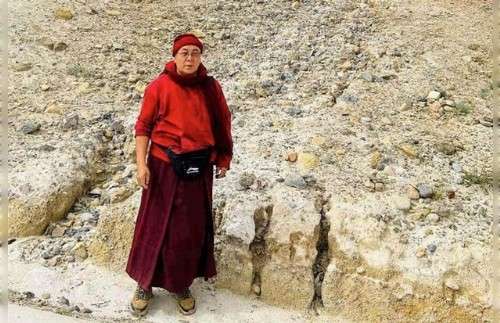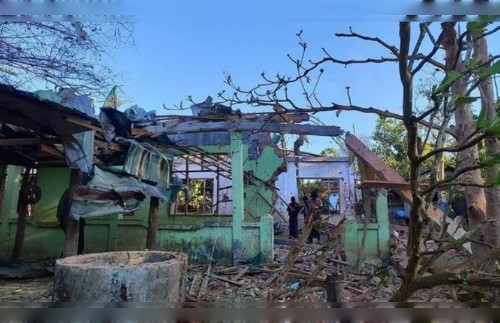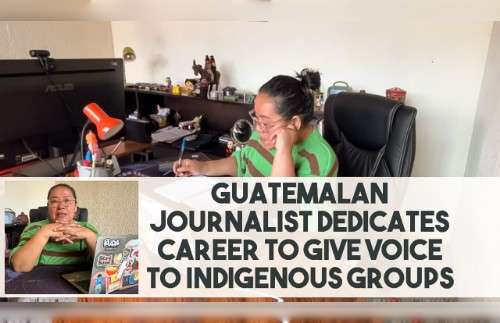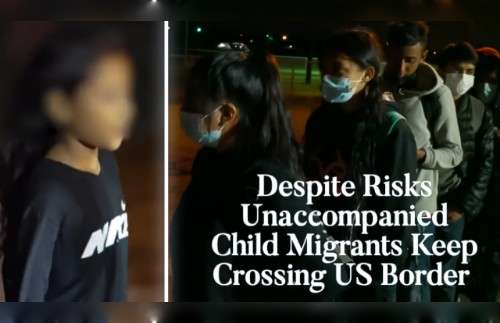Robert Coalson & Natalya Dzhanpoladova
Russian officials announced recently that the head of the IK-14 prison colony and several other officials had been dismissed after a surprise inspection revealed female convicts were being tortured and forced to work under slave-labor conditions.

The news came five years after Nadezhda Toloknnikova, a Pussy Riot protest artist who served nearly two years at IK-14 for a performance at Moscow’s Christ the Savior Cathedral, published an open letter detailing the horrific conditions at the Soviet-built barracks in a remote, “swampy” region southeast of the capital. She wrote that women were forced to work up to 17 hours a day with one day off every eight weeks and were subject to threats and violent abuse.
Tolokonnikova’s letter followed years of complaints about conditions at IK-14, complaints that continued long after the Federal Penitentiary Service (FSIN) claimed it investigated the allegations and found them unsubstantiated. The complaints continued apace after Tolokonnikova’s release on amnesty in December 2013.
“Apparently, Tolokonnikova was correct,” FSIN Deputy Director Valery Maksimenko told TASS on December 24.
The case capped off a tough 2018 for Russia’s prison system.
Simply ‘Off Their Rockers’
In July, a video emerged showing at least 17 guards at a prison in Yaroslavl abusing and beating prisoner Yevgeny Makarov.
“They methodically beat the spread-eagled man on the shins and the bottoms of his feet with rubber truncheons,” the independent Novaya Gazeta described the abuse. “The man screams plaintively, howls, begs for mercy. From time to time, they pour water over his head from a bucket.”
In November, four guards at a prison in Chelyabinsk were convicted of beating inmate Sultan Israilov to death. Officials wrote his death off as a suicide until a mass hunger strike caused a national outcry and prompted an investigation.

In January, two officials at IK-7 in Karelia were sentenced to prison terms for torturing prisoners and extorting millions of rubles from convicts and their families.
Throughout the year, prisoners-rights activists, including another Pussy Riot member, Maria Alyokhina, who spent two years in prison in the same case as Tolokonnikova, waged a public-awareness campaign under the slogan “FSIN = Gulag.”
Despite these cases and many more, FSIN deputy head Maksimenko in a year-in-review interview with Interfax on January 8 flatly rejected the comparison between his agency and the Soviet gulag.
“There is not the slightest trace of the gulag in our system today,” he said. “Those times are far behind us. If you understand by the term ‘gulag’ mass violations of human rights, mass repressions, unjust sentences, executions, torture, forced confessions, and so on, then what has this to do with the present day?… If one of our employees beats a prisoner, it isn’t a legacy of the gulag. It is, pardon the expression, that a specific employee is off his rocker.”
Maksimenko attributed such cases to “burnout” brought on by the “colossal psychological pressure” prison employees face from constant contact with criminals.
He added that because of Federal Penitentiary Service’s own commitment to openness, the installation of 22,000 video cameras, and the active monitoring of human-rights ombudsmen and civic organizations, the prison system “has become more transparent than ever before.” The numerous reports of abuse are, in fact, a sign that “people who have been in the prison system are no longer afraid to tell the truth about what they’ve seen there.”
A System ‘Built On Violence’
Makarov, the prisoner who was tortured in the Yaroslavl video, is among the many former prisoners and activists who would disagree. He spent 80 days in punitive solitary confinement after the video went public.
The Russian prison service “has created a little slave state of its own,” he told journalists when he was released after completing his sentence in October. “The law is not being obeyed there at all.”
Nikolai Kavkazsky, an opposition Yabloko activist who has served time on political charges, agrees, saying, “Russia’s entire penitentiary system is built on violence.”
“It isn’t just torture in the normal sense,” he tells RFE/RL. “It is in the day-to-day conditions and in the attitudes of the guard toward the prisoners. The entire system must be reformed.”
There is more behind the behavior of abusive prison guards than “burnout,” says Aleksei Fedyarov, head of the legal department of the prisoners’ rights organization Russia Behind Bars (Rus Sidyashchaya).
“These are normal people,” he says. “Have you read [Erich Maria] Remarque’s Spark Of Life? Middle-class people. Today they are sitting around drinking beer, and tomorrow they become Nazis, and the next day they are among the Nazis who work in concentration camps and burn people in ovens. Then they retire and live out the rest of their lives. Everyone is capable of this. There is a fascist inside everyone.”
Russian prison guards, Fedyarov argues, know what they are getting into. “They go to work there because, most often, they are from poor regions where every schoolchild dreams of a salary of 20,000 to 30,000 rubles ($300-460) and the chance to retire at the age of 35,” he says. “They go there fully aware and voluntarily. And if they are required to beat or kick someone, then that’s what they do because everyone is doing it…. They are going to work in a system that has rotted to the core and that only allows people to work in this way.”
“Is this emotional burnout?” he says. “No. It is just such a person inside such a system.”
It is a system based on violence and humiliation as well as on a strict code of silence regarding such violations, activists say.
According to statistics provided by Russia to the Council of Europe in 2015 on its prisons for the previous year, 4,097 prisoners died in custody out of a total prison population of 671,027. Of those, 404 were listed as suicides, while the homicide figure was “not available.”
Russia’s mortality rate of 61.1 per 10,000 prisoners was among the highest of the 47 countries studied.
Russia has not provided figures for subsequent Council of Europe reports on prison conditions.
According to FSIN deputy head Maksimenko, in 2017, Russia’s prison population had been reduced to 523,000. Deaths in prison have likely also been reduced because of new legislation making it easier for gravely ill prisoners to receive amnesties.
Emotional Issue
Lawyer Vera Goncharova, who is representing prisoners in Omsk in a high-profile abuse case involving allegations of beatings, torture by electric shock, threats of rape, urinating on prisoners, and more, says she has spent many hours speaking with guards while visiting prisons over the years.
“They know where they are going and why,” she says. “I wouldn’t say there is some sort of sadness or hopelessness in their eyes or thoughts. On the contrary, it is a convenient, reliable job, a job where working for just a few years qualifies you to retire early.”
“In Omsk, you meet many taxi drivers who used to work in the [prison] system, since there are many prisons in Omsk,” she adds. “Now they’re still young people getting their pensions and doing what they like with their time. Obviously, prison work isn’t easy, but they go there consciously.”
Goncharova says the only former prison guard she met “with pain in his eyes” was a man who left the system quickly because “he couldn’t handle it morally.”
“When he talks about it, he cries,” she says. “He goes to church now. He drank for a while, but he has straightened himself out. To this day, he is afraid — afraid of the law and afraid of revenge on the part of his former colleagues.”
Illegal acts, Goncharova says, go unpunished and are covered up by the silence and complicity of other prison officials. As a result, the behavior “assumes monstrous forms.”
It isn’t just that the guard who does such things is psychologically damaged,” she says. “But he also cripples the minds of others.”
On January 16, a district court in Karelia sentenced the former head of IK-7, Sergei Kossiyev, to 2 1/2 years in prison for the beating of political dissident Ildar Dadin and for extorting millions of rubles from prisoners and their families over a period of several years. Former prisoners from around the country traveled to Karelia to testify against Kossiyev.
One of them, Vasily Shambur, tells RFE/RL that the verdict and the sentence filled him with emotion.
“For me and for many others, Sergei Kossiyev is the embodiment of all the traits associated with fascism,” Shambur says. “In his every interaction with people, you could feel his arrogant, humiliating, slave-owning mentality. He didn’t care at all about human rights and had a tendency to inflict pain. The figure of Kossiyev is a monument to sadism that has been pulled down.”
“I would write on the high walls of IK-7 in large letters: ‘FSIM employees! Remember where Kossiyev is. Everyone is equal before the law,'” he adds. “That would be a good lesson for those who have forgotten what it means to be human. And there are still a lot of people like that.”
Activist Sergei Mokhatkin, who has served several terms in connection with his political activism and was most recently released on December 14, also says the legacy of the Soviet prison system is clearly evident in Russian prisons today.
“There are still posters hanging from Soviet times that say that a prison guard is not just a guard but an educator,” Mokhatkin says. “That is garbage, of course. And it really prevents the system from functioning properly. We need to transform it from a system of criminalization to one of socialization. But for now, it is just the opposite: People are not socialized in Russian prisons; instead, their physical and mental health are destroyed.”
Copyright (c) 2018. RFE/RL, Inc. Reprinted with the permission of Radio Free Europe/Radio Liberty, 1201 Connecticut Ave NW, Ste 400, Washington DC 20036





